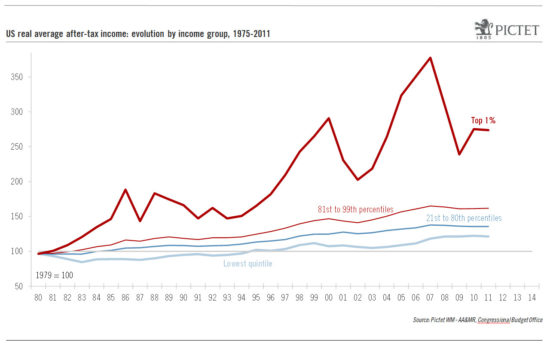The UK’s vote to quit the European Union (EU) shook markets in late June and revealed a sharply divided country. And while the EU27 are likely to take a tough line with the UK to discourage other countries from going down the same road, there is clearly a risk that Brexit is followed by further fragmentation of the EU.It is important to understand how we have arrived at such a crisis. There are, of course, many reasons (political, historic, institutional). But along with opposition to uncontrolled immigration, one common underlying theme in the rise in populism throughout the western world is inequality, and the idea that the rich are getting richer while incomes among the poor stagnate. There is some evidence that this is the case. Economists Thomas Piketty and Emmanuel Saez have calculated that the richest 1% of the American population accounted for 10% of total income at the end of the 1970s, but 20% in 2013. At the same time, figures point to, at best, a stagnation in median incomes in the US since the end of the last century.Are things much better in Europe? Figures published by the French statistical agency INSEE show, for example, that the median income in France fell by 1.1% between 2008 and 2013, while the income of the 10% households with the lowest incomes fell by 3.5%.
Topics:
Cesar Perez Ruiz considers the following as important: Brexit inequality, Brexit polarisation, Brexit politics, Perspectives
This could be interesting, too:
Perspectives Pictet writes The era of economic slowbalisation
Perspectives Pictet writes The year of the doves
Perspectives Pictet writes “The Three Amigos”
Team Asset Allocation and Macro Research writes Brexit update – PM May seeks new direction
The UK’s vote to quit the European Union (EU) shook markets in late June and revealed a sharply divided country. And while the EU27 are likely to take a tough line with the UK to discourage other countries from going down the same road, there is clearly a risk that Brexit is followed by further fragmentation of the EU.
It is important to understand how we have arrived at such a crisis. There are, of course, many reasons (political, historic, institutional). But along with opposition to uncontrolled immigration, one common underlying theme in the rise in populism throughout the western world is inequality, and the idea that the rich are getting richer while incomes among the poor stagnate. There is some evidence that this is the case. Economists Thomas Piketty and Emmanuel Saez have calculated that the richest 1% of the American population accounted for 10% of total income at the end of the 1970s, but 20% in 2013. At the same time, figures point to, at best, a stagnation in median incomes in the US since the end of the last century.

Are things much better in Europe? Figures published by the French statistical agency INSEE show, for example, that the median income in France fell by 1.1% between 2008 and 2013, while the income of the 10% households with the lowest incomes fell by 3.5%. It is thus no surprise to learn that the areas in England (although not in Scotland) with the lowest median incomes were the ones most solidly in favour of Brexit, while those with the highest median incomes voted equally firmly to stay in the EU.
During much of the current economic cycle, productivity growth has been very low in the US, just as in Europe, thus explaining the weak rise in wages in recent years and contributing to the feeling among many people that they are being left behind by economic recovery. Such a development can make the easy solutions proposed by populists look appealing.
Some far-reaching ways to deal with inequality are being put forward. A proposal that the state pay a universal living allowance garnered 24% support in a referendum in Switzerland in June, for example. We will likely see similar initiatives in northern Europe in the coming years.
But there may still be room for more ‘traditional’ ways of tackling the problems associated with low growth and stagnation. After years of austerity in the western world, more could undoubtedly be done to modernise education, to encourage entrepreneurship and innovation, and to raise capital spending (both in the public and private sector). In any case, if Europe is to achieve a turnaround in the trend towards populism, the lack of income growth among lower-earning segments needs to be addressed.
